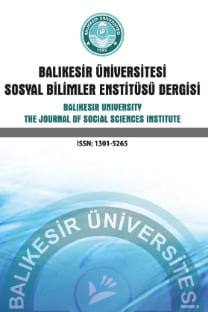BİLİMSEL ARAŞTIRMA YÖNTEMLERİ DERSİNE İLİŞKİN ÖĞRETMEN ADAYLARININ ALGI VE BEKLENTİLERİ
Problem: Her öğretim seviyesinde olduğu gibi üniversite seviyesindeki öğrencilerin de almış oldukları derslere yönelik algı ve tutumları öğretimin etkisini belirleyen unsurlardandır. Derse veya ders içerisindeki yaşantılara olumsuz bir yaklaşım sergileyen öğrencilerin, dersin hedeflerine ulaşma noktasında hedeflenen seviyeye ulaşmaları zorlaşır. Bu nedenle öğrencilerin ders ve ders içi yaşantılara yönelik algı ve tutumlarının belirlenmesi oldukça önemlidir Araştırmanın Amacı: Bu çalışmanın amacı,matematik öğretmen adaylarının bilimsel araştırma yöntemleri dersine ilişkin algı ve beklentilerini belirlemektir. Yöntem: Bu çalışmada nitel araştırma desenlerinden “olgu bilim” deseni kullanılmıştır. Bu bağlamda, araştırmanın örneklemi, 2010-2011 eğitim-öğretim yılı güz döneminde “bilimsel araştırma yöntemleri” dersini alan ilköğretim matematik öğretmenliği İÖM ana bilim dalından 81 2. sınıf ve ortaöğretim matematik öğretmenliği OÖM ana bilim dalından 26 4. sınıf öğrencisinden oluşmaktadır. Veri toplama aracı olarak 8 açık uçlu sorudan oluşan bir anket kullanılmıştır. Bu araştırmada veri toplama aracı olarak kullanılan açık uçlu sorular Saban, 2006 ’nın çalışmasından yararlanılarak hazırlanmıştır. Verilerin analizi “içerik analiz tekniği” kullanılarak analiz edilmiştir. Sonuçlar ve Öneriler: Elde edilen bulgulardan; 1 bu dersin öğrencilere bilimsel araştırmaya ilişkin belli bir bakış açısı kazandırdığı, 2 bu dersin iki dönmede okutulması gerektiği, 3 lisansüstü programlarında okutulması gerektiği, 4 bu dersle ilgili sınıf içi uygulamaların daha fazla yapılması gerektiği; 5 bu dersin içeriğinde yer alan bilimsel araştırma kavramının ve bilimsel araştırmacının ne olduğu ile ilgili hedeflerin öğrenciler tarafından kazanıldığı; 6 bu dersin öğretmen adaylarının lisansüstü eğitim yapmaya ilişkin bakış açılarını olumsuz yönde etkilediği sonuçlarına varılmıştır.
REGARDING “SCIENTIFIC RESEARCH METHODS” COURSE
Problem: As in every educational stage, university students’ perceptions and attitudes towards the courses they have taken are among the factors that determine the impact of education. It becomes difficult for the students, who present a negative approach towards the course or the experiences during the course, to reach the targeted level in terms of achieving the goals of the course. For that reason, it is considerably important to identify students’ perceptions and attitudes towards the courses and experiences during the courses. Aim of the Study: The aim of this study is to identify mathematics teacher candidates’ perceptions and expectations regarding “scientific research methods” course Aim of the Study: The aim of this study is to identify mathematics teacher candidates’ perceptions and expectations regarding “scientific research methods” course. Method: “Phenomenological” research design, which is among the qualitative research designs, has been used in this study. In this regard, the sample of the research is composed of 81 second-year students from the Department of Elementary Education Mathematics Teaching EEM and 26 fourth-year students from the Department of Secondary Education Mathematics Teaching SEM who are taking “scientific research methods” course in the fall semester of 2010-2011 academic year. A survey, which is composed of 8 open-ended questions, has been used as data collection tool. Open-ended questions, which have been used in this research as data collection tool, have been prepared by benefitting from the study of Saban, 2006 . Data have been analyzed using “content analysis method”. Results and Suggestions: In view of the obtained data, following results have been observed: 1 This course has earned students a certain perspective regarding scientific research; 2 This course should be given in two semesters; 3 This course should be given in postgraduate programs; 4 Classroom activities of this course should be performed more; 5 Students have acquired the concept of scientific research, which is included in the content of this course, and the objectives regarding what scientific researcher means; 6 It has negatively affected teacher candidates’ perspectives on commencing postgraduate education.
___
- Blank, G. (2004). Teaching qualitative data analysis to graduate students. Social Science Computer Review (22), 187-196.
- Breidenstein, A., Liberatore, I., Lioi, T., Miro, E., Weber, S., & Stoeck, S. (2001). Outcomes of preservice teachers’ qualitative research. Clearing House (74), 141-144.
- Cobb, A. K., & Hoffart, N. (1999). Teaching qualitative research through participatory coursework and mentorship. Journal of Professional Nursing , 15, 331- 339.
- Dilmaç, O., Koçyiğit, S., Tuğluk, M. N., & Kaya, H. İ. (2008). Okul Öncesi Öğretmen Adaylarının Resim Öğretimi Dersine ilişkin Algılarının incelenmesi (Erzurum il Örneği). Kazım Karabekir Eğitim Fakültesi Dergisi (17).
- Güven, B., & Ersoy, E. (2007). Sınıf Öğretmeni Adaylarının Hayat Bilgisi ve Sosyal Bilgiler Öğretim I Dersine İlişkin ÖzYeterlikAlgıları ve Bilişsel Tutumlarının Belirlenmesi . Pamukkale Üniversitesi Eğitim Fakültesi Dergisi , 1 (21). Kıncal, R. Y. (1999). Öğretmenlik Mesleğine Giriş. Erzurum: 2. Baskı Eser Ofset.
- Nartgün, Z., Uluman, M., Akın, Ç., Çelik, T., & Çevik, C. (2008). Öğretmen Adaylarının BilimselAraştırma Öz Yeterliklerinin İncelenmesi. Sakarya Üniversitesi Eğitim Fakültesi (Dü.), XVII. Ulusal Eğitim Bilimleri Kurultayı. Sakarya: 1-3 Eylül.
- Oral, B., & Dağlı,A. (1999). ÖğretmenAdaylarının Okul Deneyimine İlişkin Algıları. Çağdaş Eğitim Dergisi (254), 18-24.
- Saban, A. (2006). Lisansüstü öğrencilerin nitel araştırma metodolojisine ilişkin algıları. Muğla Üniversitesi Eğitim Fakültesi , XV. Ulusal Eğitim Bilimleri Kurultayı. Muğla.
- Şahin, M., Ellez, M., & Günter, T. (2009). Türk Eğitim Tarihi Dersine ilişkin Öğrencilerin Algı ve Beklentileri. Ege Üniversitesi Eğitim Fakültesi , XVIII. Eğitim Bilimleri Kurultayı. İzmir: 1-3 Ekim.
- Şahin, S., & Yıldırım, S. (2010). Öğrenme Tercihleri ve Ders Algısı. Ahi Evran Üniversitesi Eğitim Fakültesi Dergisi , 11 (3), 153-168.
- Topses, G. (2000). Sınıf Yönetimi: Öğrenci Davranışlarını Etkileyen Sosyal ve Psikolojik Faktörler ve Sorunlar (Bölüm 1). Ankara: Nobel Yayın Dağıtım.
- Yıldırım, A., & Şimşek, H. (2005). Sosyal Bilimlerde Nitel Araştırma Yöntemleri. Ankara: Seçkin Yayıncılık.
- YÖK. (2006). Eğitim Fakültelerinde Uygulanacak Yeni Programlar Hakkında Açıklama. http://www.yok.gov.tr/egitim/ogretmen/programlar_aciklama. doc.
- ISSN: 1301-5265
- Yayın Aralığı: Yılda 2 Sayı
- Başlangıç: 1998
- Yayıncı: Balıkesir Üniversitesi Sosyal Bilimler Enstitüsü
Sayıdaki Diğer Makaleler
ÖRGÜTSEL BAĞLILIK İLE DEMOGRAFİK ÖZELLİKLER ARASINDAKİ İLİŞKİNİN İNCELENMESİ: BİR UYGULAMA ÇALIŞMASI
BANKACILIK SEKTÖRÜNDE HİZMET KALİTESİNİN SERVQUAL YÖNTEMİ İLE ÖLÇÜLMESİ
XIX. YÜZYILDA OSMANLI-BELÇİKA TİCARİ İLİŞKİLERİ
ADAPTATION OF KWL CHARTS TO THE INTERNET AND THE USE OF WEB PAGES IN ENGLISH LANGUAGE TEACHING
İNSAN KAYNAKLARINA BAKIŞ AÇISININ SAPTANMASINA YÖNELİK BİR ARAŞTIRMA
Tamer KEÇECİOĞLU, Mustafa Kemal YILMAZ
PERS HAKİMİYETİ ALTINDA BATI ANADOLU’DA SİKKE BASIMI
HİZMET SEKTÖRÜNDE TÜKETİCİ GÜVENİ VE MÜŞTERİ BAĞLILIĞI: BANKACILIK SEKTÖRÜNE YÖNELİK BİR ARAŞTIRMA
